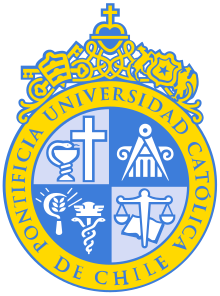 601-700
601-700 


The Pontificia Universidad Católica de Chile (UC) was founded on June 21, 1888, to offer training in traditional professions and in technological and practical fields such as business, accounting, chemistry, and electricity. On February 11, 1930, Pope Pius XI declared it a Pontifical University, and in 1931 it was granted academic autonomy by the Chilean government. It is a private (with public support), urban, multi-campus university. It is one of eight Catholic universities in Chile, and one of 61 institutions within the Chilean university system. Its 18 Faculties are distributed on four campuses in Santiago and one regional campus located in southern Chile. Approximately 31,000 students are enrolled in graduate and undergraduate programs. Over the last few years the University’s leadership in research and graduate programs has had considerable influence on the country’s cultural and scientific development. Among other achievements are an important number of inventions in chemistry (a copper-refining process), in engineering (an induction oven), and in medicine (vaccines). Graduates of the School of Architecture have also made important contributions to the country with such work as the UC Central Campus and the National Library. Upon the120th anniversary of its foundation, the UC continues to make every effort to develop its existing facilities and institutions, as well as to make its intellectual, creative, and spiritual capacity available to the community. The University has established academic agreements with more than three hundred universities in forty six countries.
 601-700
601-700 
| Subject | Rank |
|---|---|
Civil Engineering | 51-75 |
Geography | 76-100 |
Political Sciences | 76-100 |
Communication | 76-100 |
Ecology | 101-150 |
Agricultural Sciences | 101-150 |
Food Science & Technology | 151-200 |
Transportation Science & Technology | 151-200 |
| Undergraduate Programs |
|---|
Advertising |
Aesthetics |
Agriculture And Forestry |
Architecture |
Art |
Astronomy |
Audiovisual Management |
Biochemistry |
Biology |
Chemistry |
Chemistry And Pharmacy |
College Arts And Humanities |
College Social Sciences |
Commercial Engineering |
Construction |
Dentistry |
Design |
Early Childhood (Education) |
Engineering |
General Basic Education |
General Basic Education (Headquarters Villarrica) |
Geography |
History |
Journalism |
Kinesiology |
Letters With A Major In Linguistics And Literature |
Letters With A Major In Linguistics And Literature |
Marine Biology |
Mathematics And Statistics |
Medicine |
Music |
Natural Sciences And Mathematics College |
Nursing |
Nutrition And Dietetics |
Pastoral Studies |
Performance |
Philosophy |
Physics |
Political Science |
Psychology |
Right |
Social Work |
Sociology |
Teaching In Secondary Education |
Theology |
| Graduate Programs |
|---|
Business Administration |
Construction Business Management |
Critical Care Nursing Of Adults |
Critical Care Nursing Of Children |
Information Management |
Nursing High-Risk Newborn |
Nursing In Family And Community Health |
Nursing Of Adults With Heart Problems |
Nursing Of Adults With Kidney Problems |
Nursing The Elderly |
Pep: Adult Family Medicine |
Pep: Anesthesiology |
Pep: Child Family Medicine |
Pep: Clinical Laboratory |
Pep: Dermatology |
Pep: Emergency Medicine |
Pep: General Surgery |
Pep: Internal Medicine |
Pep: Neurology |
Pep: Neurosurgery |
Pep: Nuclear Medicine |
Pep: Obstetrics And Gynecology |
Pep: Ophthalmology |
Pep: Otolaryngology |
Pep: Pathology |
Pep: Pediatric Neurology |
Pep: Pediatrics |
Pep: Psychiatry |
Pep: Psychiatry Child And Adolescent |
Pep: Public Health |
Pep: Radiation Oncology |
Pep: Radiology |
Pep: Traumatology And Orthopedics |
Pep: Urology |
Post Degree In Family Studies |
Ps: Adult Intensive Care |
Ps: Arrhythmology And Cardiac Electrophysiology |
Ps: Cardiology |
Ps: Cardiovascular Anesthesia |
Ps: Cardiovascular Surgery |
Ps: Child Care Medicine |
Ps: Clinical Immunology And Rheumatology |
Ps: Coloproctology |
Ps: Diabetes And Nutrition |
Ps: Digestive Surgery |
Ps: Endocrinology |
Ps: Gastroenterology |
Ps: Geriatrics |
Ps: Gynecologic Oncology |
Ps: Haemostasis And Thrombosis |
Ps: Hematology |
Ps: Infectious Diseases |
Ps: Interventional Cardiology |
Ps: Maternal-Fetal Medicine |
Ps: Medical Oncology |
Ps: Neonatal |
Ps: Nephrology |
Ps: Pediatric Cardiology |
Ps: Pediatric Endocrinology |
Ps: Pediatric Gastroenterology And Nutrition |
Ps: Pediatric Hematology And Oncology |
Ps: Pediatric Infectious Diseases |
Ps: Pediatric Nephrology |
Ps: Plastic And Reconstructive Surgery |
Ps: Respiratory Diseases Of Adults |
Ps: Respiratory Diseases Of Children |
Ps: Surgical Oncology And Head And Neck |
Ps: Transfusion Medicine |
Ps: Urology |
Ps: Vascular Surgery |
Psychodiagnostic With Projective Techniques |
Risk Prevention In The Productive Sector |
School Of Social Work |
Troubled Child Nursing Oncology |
Troubled Nursing Adult Oncology |